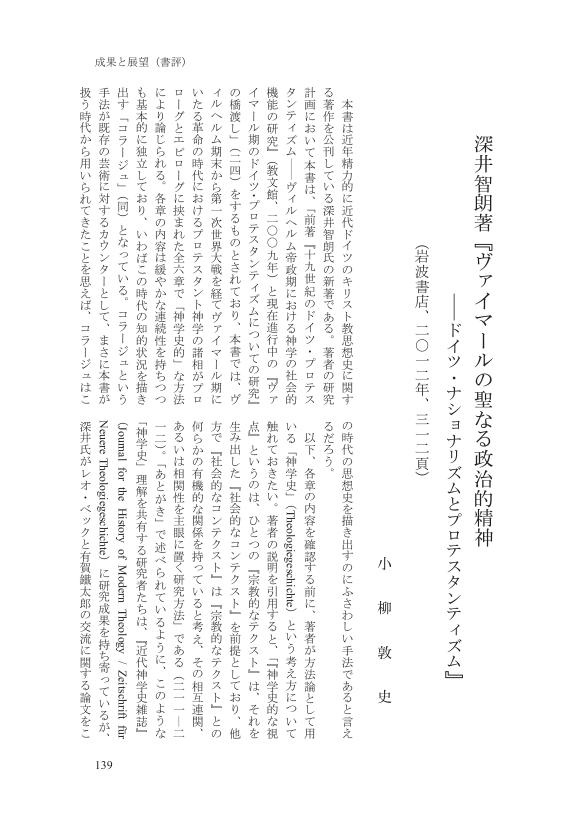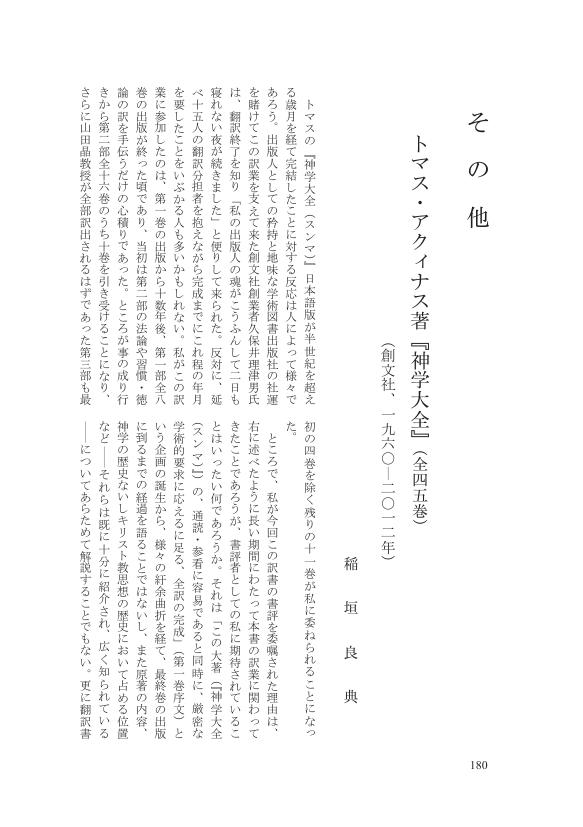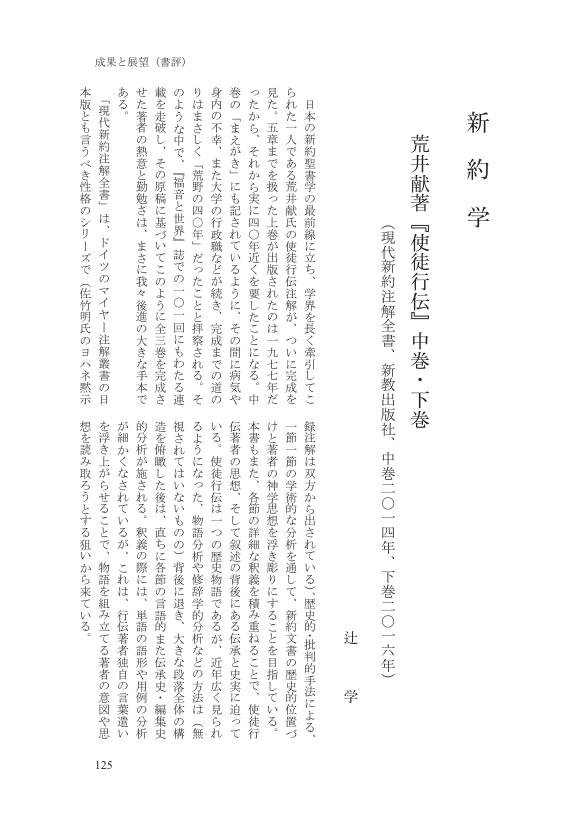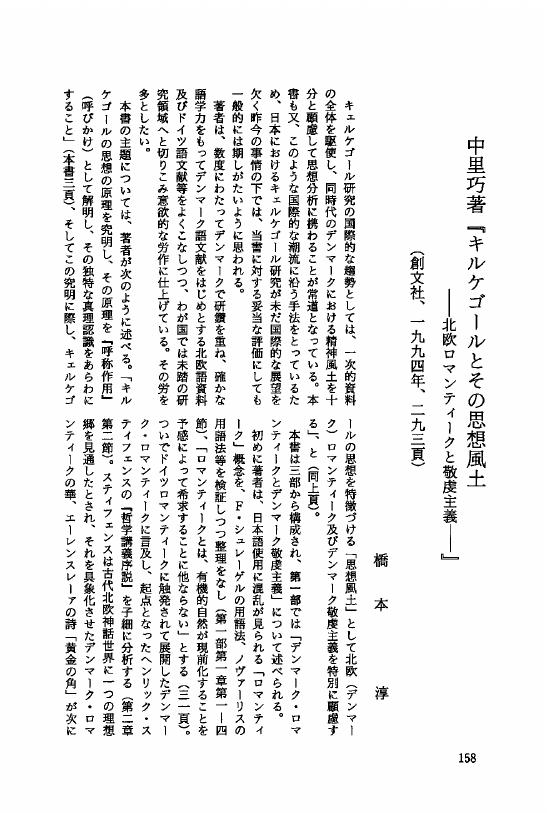- 著者
- 小柳 敦史
- 出版者
- 日本基督教学会
- 雑誌
- 日本の神学 (ISSN:02854848)
- 巻号頁・発行日
- vol.52, pp.139-144, 2013 (Released:2016-02-18)
- 著者
- 小柳 敦史
- 出版者
- 日本基督教学会
- 雑誌
- 日本の神学 (ISSN:02854848)
- 巻号頁・発行日
- vol.52, pp.139-144, 2013
46 0 0 0 OA トマス・アクィナス『神学大全』全四五巻(創文社、一九六〇-二〇一二年)
- 著者
- 稲垣 良典
- 出版者
- 日本基督教学会
- 雑誌
- 日本の神学 (ISSN:02854848)
- 巻号頁・発行日
- vol.52, pp.180-185, 2013 (Released:2016-02-18)
- 著者
- 水谷 誠
- 出版者
- 日本基督教学会
- 雑誌
- 日本の神学 (ISSN:02854848)
- 巻号頁・発行日
- vol.49, pp.174-179, 2010
- 著者
- 森本 あんり
- 出版者
- 日本基督教学会
- 雑誌
- 日本の神学 (ISSN:02854848)
- 巻号頁・発行日
- vol.2005, no.44, pp.183-188, 2005
- 被引用文献数
- 1
8 0 0 0 OA クィア神学の可能性
- 著者
- 朝香 知己
- 出版者
- 日本基督教学会
- 雑誌
- 日本の神学 (ISSN:02854848)
- 巻号頁・発行日
- vol.50, pp.55-73, 2011-09-06 (Released:2013-05-22)
- 参考文献数
- 6
This article examines the development of “Queer Theology” as a theological response to "Queer Theory." Queer theory focuses on differences among heterosexuals/homosexuals and questions the essentialist idea of sexual identity. It argues against the normativity of heterosexuality and aims to transcend the dualistic thinking of heterosexuality and homosexuality. Thus, queer theology incorporates such features of queer theory into theology. In summary, it is theology practiced by queer Christians, opposing theological heteronormativity and exploring queer things in Christianity. For the debate on homosexuality in Christianity, in a sense, queer theology seems to weaken lesbian/gay liberation based on its view of stable human sexuality owing to Creation by its constructionist position or to result in sexual lawlessness because of its position outside the norm. On the other hand, it warns of idolatry by demonstrating that normalization is always done by humans, reveals that heteronormativity leads to violence such as discrimination or oppression and consequently seems to encourage a more ethical view as a whole.
- 著者
- 辻 学
- 出版者
- 日本基督教学会
- 雑誌
- 日本の神学 (ISSN:02854848)
- 巻号頁・発行日
- vol.57, pp.125-130, 2018-09-25 (Released:2020-06-15)
6 0 0 0 OA 「自分も哲学者に成りたくなつた」 内村鑑三晩年の夢
- 著者
- 関根 清三
- 出版者
- 日本基督教学会
- 雑誌
- 日本の神学 (ISSN:02854848)
- 巻号頁・発行日
- vol.61, pp.9-33, 2022-09-25 (Released:2023-12-07)
6 0 0 0 OA 書評(赤木善光著『宗教改革者の聖餐論』(教文館、二〇〇五年、六二七頁))
- 著者
- 倉松 功
- 出版者
- 日本基督教学会
- 雑誌
- 日本の神学 (ISSN:02854848)
- 巻号頁・発行日
- vol.2006, no.45, pp.149-154, 2006-09-21 (Released:2009-10-23)
5 0 0 0 OA 日本におけるドストエフスキー受容と「研究」
- 著者
- 松本 昌子
- 出版者
- 日本基督教学会
- 雑誌
- 日本の神学 (ISSN:02854848)
- 巻号頁・発行日
- vol.1982, no.21, pp.126-147, 1982-02-28 (Released:2010-05-07)
- 参考文献数
- 26
- 著者
- 加藤 喜之
- 出版者
- 日本基督教学会
- 雑誌
- 日本の神学 (ISSN:02854848)
- 巻号頁・発行日
- vol.53, pp.48-69, 2014 (Released:2016-02-25)
The question this paper asks is whether theology can still claim universality. With the rise of multivalent postmodern theologies and of politically-correct mandates in public space, theology as a discipline ceases to make universal claims. However, a series of recent debates between two radically different thinkers brings a renewed philosophico-theological interest in the universal claim of Christianity. The paper focuses on the debate between Hegelian-Lacanian philosopher Slavoj Žižek and Anglican theologian John Milbank in their attempt to articulate the universal claim of Christianity vis-à-vis the domianant global political economy. The first section discusses the ontological and genealogical bases of their understanding of Christian universality. The fundamentally diverse ontologies of void (Žižek) and of peace (Milbank) are situated in the history of theology. The second section examines the role that the representation of Christ plays in Žižek and Milbank's claim of theological universality in relation to the concept of freedom.
3 0 0 0 OA 書評(門脇佳吉著『禅仏教とキリスト教神秘主義』(岩波書店、一九九一年、二七一頁))
- 著者
- 八木 誠一
- 出版者
- 日本基督教学会
- 雑誌
- 日本の神学 (ISSN:02854848)
- 巻号頁・発行日
- vol.1992, no.31, pp.171-176, 1992-09-05 (Released:2009-10-23)
3 0 0 0 OA 「神学とはクィアなもの」? エリザベス・スチュアートの「クィア神学」理解の批判的考察
- 著者
- 工藤 万里江
- 出版者
- 日本基督教学会
- 雑誌
- 日本の神学 (ISSN:02854848)
- 巻号頁・発行日
- vol.57, pp.26-48, 2018-09-25 (Released:2020-06-15)
- 参考文献数
- 16
A British theologian Elizabeth Stuart (1963-) argues that theology is fundamentally “queer” enterprise since Christianity tells us the fact that all socially constructed “identities,” including sexual and gender identities, have no absolute importance. According to Stuart, whereas “gay and lesbian theology” attempts to interrogate theology based on one’s sexual or gender identity, “queer theology” attempts to interrogate the notion of sexuality and gender based on one’s Christian identity. In this paper, Stuart’s understanding of “queer theology” will be explored through an examination of her arguments about baptism, ecclesiology, and eschatology. I will also analyze her use of the term “queer” as well as the term “theology” and clarify some issues inherent in her understanding of “queer theology.”
3 0 0 0 OA 書評(『日本キリスト教婦人矯風会百年史』(ドメス出版、一九八六年、一〇六二頁))
- 著者
- 倉橋 克人
- 出版者
- 日本基督教学会
- 雑誌
- 日本の神学 (ISSN:02854848)
- 巻号頁・発行日
- vol.1987, no.26, pp.90-97, 1987-09-25 (Released:2009-10-23)
- 著者
- 茂 牧人
- 出版者
- 日本基督教学会
- 雑誌
- 日本の神学 (ISSN:02854848)
- 巻号頁・発行日
- vol.50, pp.186-191, 2011-09-06 (Released:2013-05-22)
2 0 0 0 OA イエス・キリストの信実か、イエス・キリストへの信仰か? ーロマ三・二二の釈義的考察
- 著者
- 原口 尚彰
- 出版者
- 日本基督教学会
- 雑誌
- 日本の神学 (ISSN:02854848)
- 巻号頁・発行日
- vol.54, pp.76-95, 2015 (Released:2017-04-21)
- 参考文献数
- 1
The prepositional phrase dia. pi,stewj vIhsou/ Cristou/ in Rom 3:22 modifies dikaiosu,nh de. qeou/(the righteousness of God). The implied subject of pi,stij is Christ and the genitive noun vIhsou/ Cristou/ is used subjectively. The phrase does not mean “the faith in Jesus Christ” but “the faithfulness of Jesus Christ.” The faithfulness of God (Rom 3:3) consists in the fulfillment of his words of promise. The faithfulness of God was realized by the faithful action of the Son of God, namely, Christ (cf. I Cor 1:18-20). Christian Faith is defined as a belief in the fulfillment of the promise of God through Christ’s faithful act (Rom 3:28; Gal 3:2, 5, 7). It is a response to the faithfulness of God revealed by that of Christ. We can conclude that the thesis of justification by faith (Rom 3:21, 28; Gal 2:16) is not based on anthropology but on Christology.
- 著者
- 橋本 淳
- 出版者
- 日本基督教学会
- 雑誌
- 日本の神学 (ISSN:02854848)
- 巻号頁・発行日
- vol.1995, no.34, pp.158-162, 1995-10-05 (Released:2009-10-23)
2 0 0 0 OA 被爆地ナガサキから─「浦上燔祭説」成立の背景と問題点
- 著者
- 小西 哲郎
- 出版者
- 日本基督教学会
- 雑誌
- 日本の神学 (ISSN:02854848)
- 巻号頁・発行日
- vol.56, pp.154-159, 2017-09-25 (Released:2019-06-05)
2 0 0 0 OA 「わたしを愛しているか」
- 著者
- 小林 昭博
- 出版者
- 日本基督教学会
- 雑誌
- 日本の神学 (ISSN:02854848)
- 巻号頁・発行日
- vol.55, pp.39-66, 2016 (Released:2018-02-22)
According to biblical interpretations that employ queer theory, the three dialogues between Jesus and Peter (in John 21:15–17) about love can be understood as a male–male romance. However, these three dialogues conclude with Jesus saying, “feed my sheep,” making it implausible that male–male romance is the subject of these dialogues. Therefore, the question is why do these dialogues not take faith as their subject as the dialogue between Jesus and Thomas in John 20:24–29 does? In my view, this problem can be resolved using the homosocial theory. In short, Jesus and Peter’s dialogue about love is fundamentally linked to the love between a teacher and a disciple that embodied homoeroticism and homosociality in the Hellenistic world. Hence, “love” was a necessary condition for Peter to be appointed as the Church’s representative.









